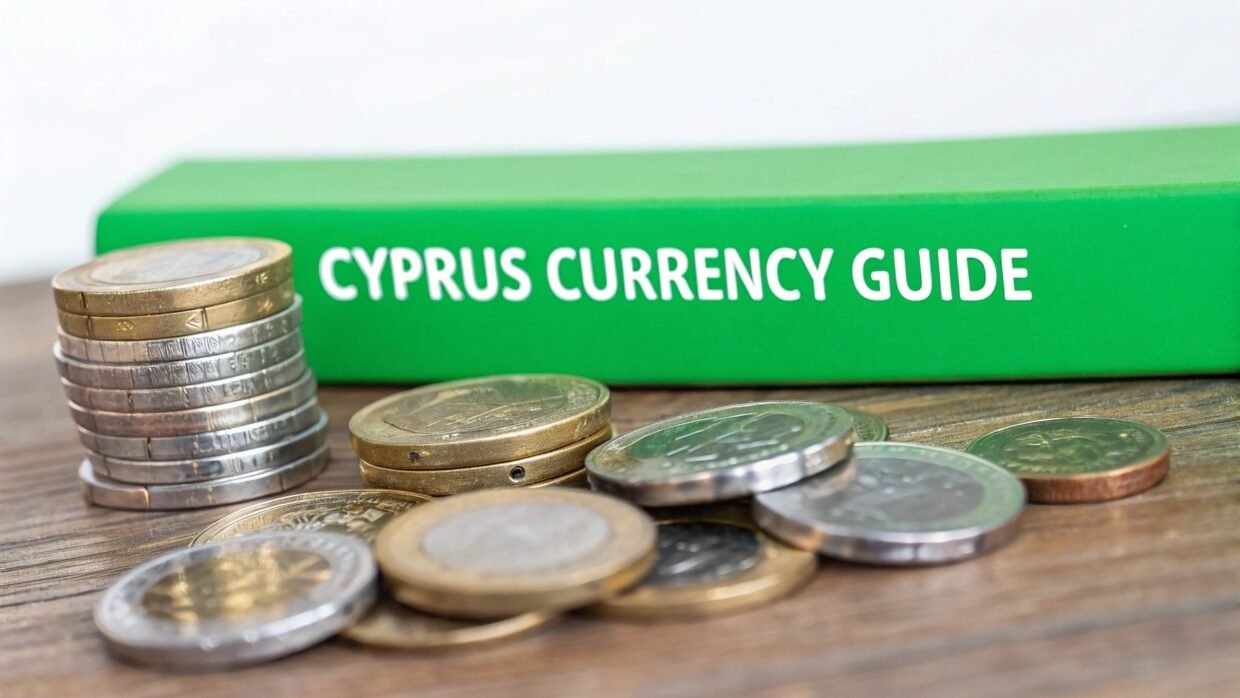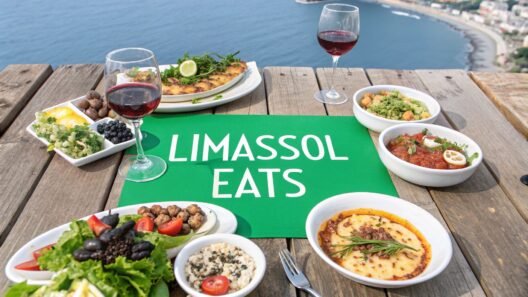When you're planning a trip to Cyprus, one of the first things you'll want to sort out is your money. The good news is that for most visitors, it’s quite straightforward. The official currency in the Republic of Cyprus (the southern part of the island) is the Euro (€).
However, things get a little different if you plan on exploring the whole island. Head north, and you'll find the official currency is the Turkish Lira (TRY). This creates a unique dual-currency situation that's good to know about before you go.
Understanding the Currency in Cyprus
Getting your head around the island's money is pretty simple once you know the lay of the land. Since the south adopted the Euro, it's become incredibly easy for travellers from the UK and the rest of Europe to manage their holiday spending, as it's the same currency they might use in Spain, Greece, or Italy.
The big change happened back on 1 January 2008, when Cyprus officially joined the Eurozone. The country waved goodbye to its long-serving Cypriot pound and welcomed the Euro. The switch was made at a fixed rate of CYP 0.585274 for every one Euro, a move that tied the island's economy much closer to the European Union.
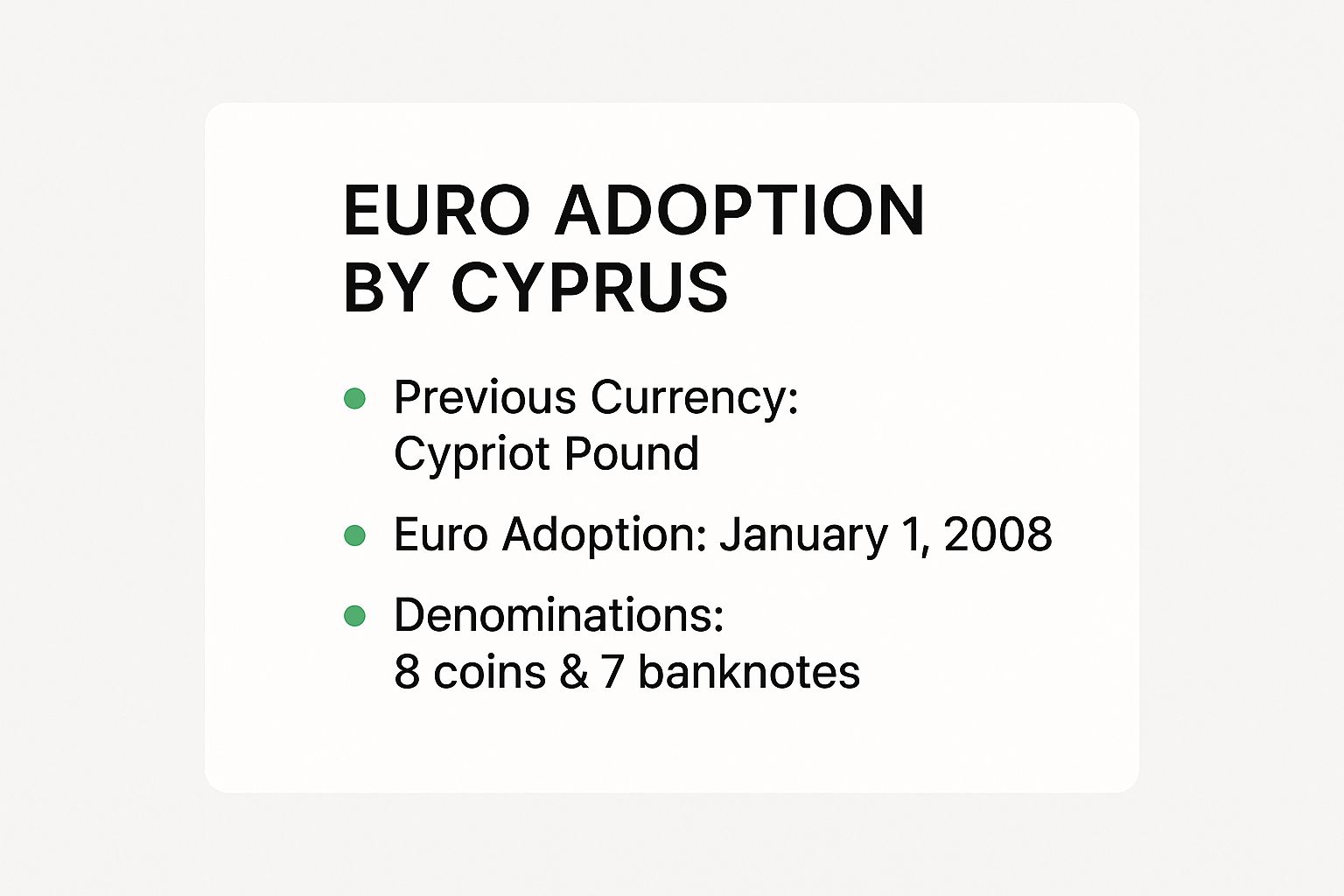
This quick overview shows you the key details, from the old Cypriot Pound to the familiar Euro notes and coins you’ll be using today.
North vs South A Tale of Two Currencies
While the south runs entirely on the Euro, the north is a different story. The Turkish Lira is the official currency there, but you’ll find that many tourist spots are happy to accept Euros. Just be aware that the exchange rate you get on the spot might not be the best.
This is a really important distinction for anyone thinking of crossing the Green Line to see both sides of the island. For a more detailed look at this, you might find our full guide on what currency Cyprus uses helpful.
To make things crystal clear, here’s a quick breakdown of what to expect on each side of the island.
Currency at a Glance North vs South Cyprus
This table sums up the currency situation across Cyprus, so you know exactly what you’ll need and where.
| Region | Official Currency | Symbol | Commonly Accepted |
|---|---|---|---|
| South Cyprus (Republic of Cyprus) | Euro | EUR (€) | Euro Only |
| North Cyprus | Turkish Lira | TRY (₺) | Lira, Euro, Pounds |
Ultimately, having Euros will get you by in most tourist areas across the entire island, but for the best value in the north, it’s always a smart move to have some Turkish Lira on hand.
From the Cypriot Pound to the Euro: A Brief History
Long before the Euro was the standard, Cyprus had its own unique currency: the Cypriot Pound (CYP). Understanding this little bit of history adds some fascinating colour to the financial landscape you'll find on your holiday, touching on the island's deep-rooted ties to Britain and its journey into the heart of modern Europe.
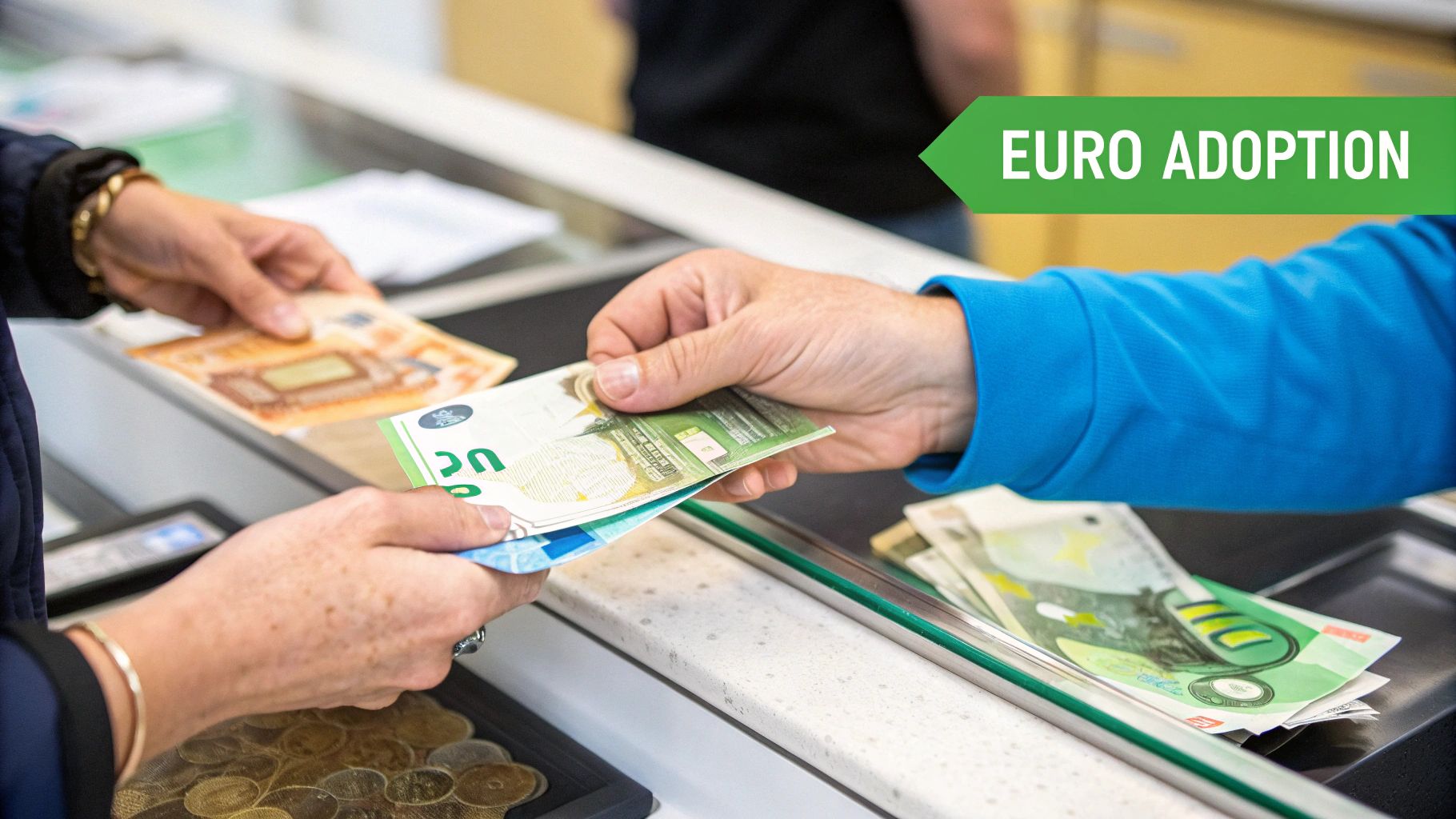
The Cypriot Pound's story starts back in 1879 under British administration. It was originally pegged one-to-one with the British Pound Sterling, forging a solid financial link that would last for nearly a century. This parity was a clear reflection of the close historical bond between the two nations. It's interesting to look back at the historical exchange rates between GBP and CYP to see how that relationship evolved.
For decades, the Cypriot Pound was the backbone of the island's economy, navigating the nation through immense change and growth. But as Cyprus began to look towards mainland Europe, a new chapter was about to begin.
The Euro Adoption: A New Era
Making the switch to the Euro was far more than just a simple currency change. It marked a huge step in the country's integration into the wider European community, especially after it had joined the European Union in 2004. You can find out more about Cyprus's status within the EU in our detailed guide.
On 1 January 2008, Cyprus officially became part of the Eurozone, and the Euro took over as legal tender. The changeover was meticulously planned, with a permanently fixed exchange rate set to ensure a smooth and fair transition for everyone, from local businesses to ordinary citizens.
This shift wasn't just about money; it was a symbolic alignment with the European economic framework. The move was designed to boost stability, simplify trade, and make travel completely seamless for millions of visitors from other Eurozone countries.
Today, the Cypriot Pound is a thing of the past, fondly remembered and found in collectors' cabinets. The Euro is what you'll use for everything, whether you're grabbing a coffee in Paphos or settling your hotel bill in Limassol, cementing the island’s place firmly in modern Europe.
Navigating the Currency in Northern Cyprus
Cross the Green Line into the northern part of Cyprus, and you'll find things are a bit different – especially when it comes to your wallet. The official currency here is the Turkish Lira (TRY), often shown with the ₺ symbol. It's a key bit of information to have if you're planning to see the whole island.
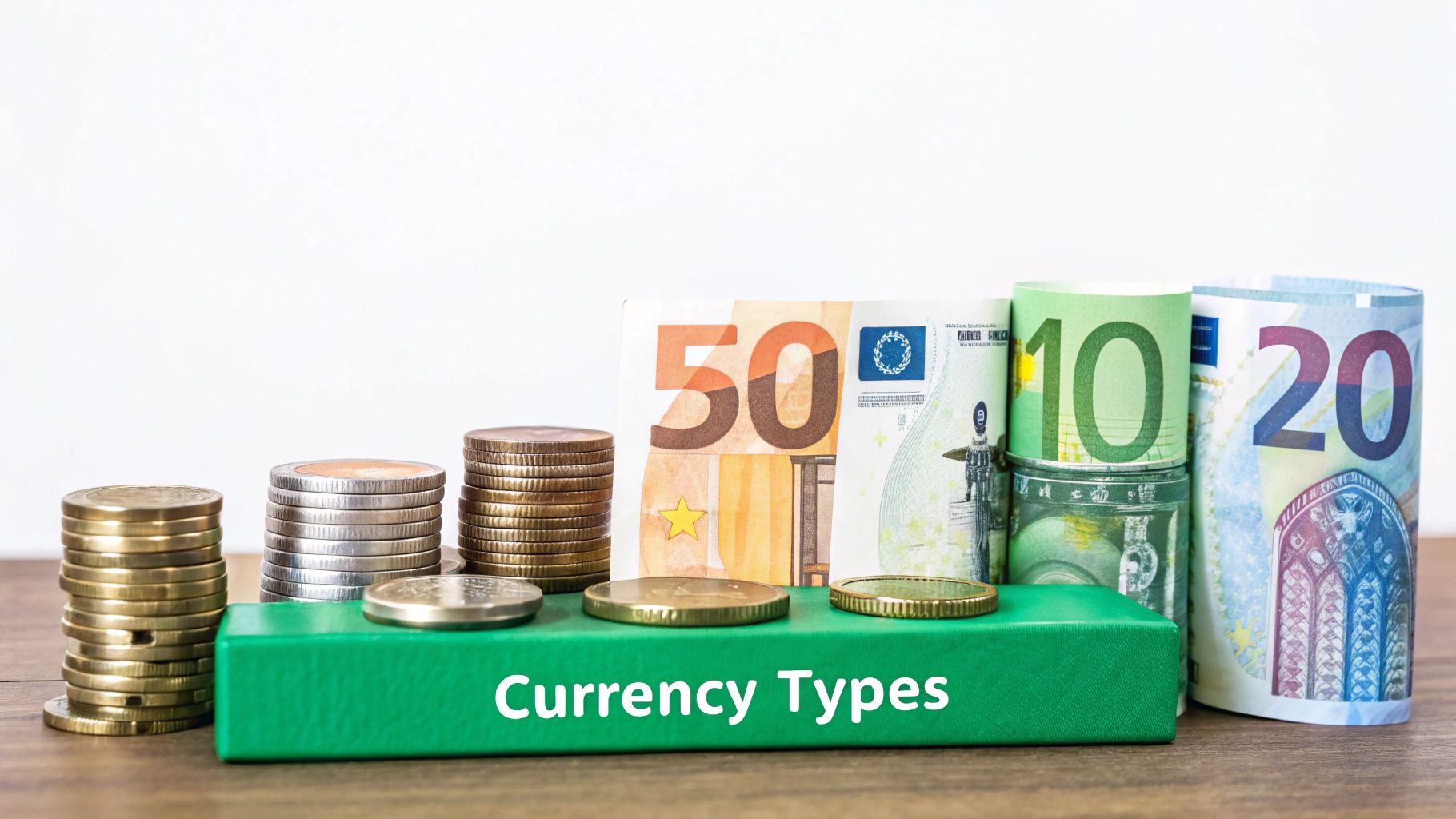
Now, while the Turkish Lira is the official legal tender, the situation on the ground can be quite flexible. This is particularly true in the main tourist hubs like Kyrenia (Girne) and the northern part of Nicosia (Lefkoşa). You'll find that many hotels, bigger restaurants, and tour companies are perfectly happy to take Euros, and sometimes even British Pounds.
That said, trying to get by on Euros alone in the north isn't the smartest move for your budget.
Should You Pay with Euros in the North?
Think of it this way: paying with Euros in a place that officially uses Lira is a bit like changing money at an airport kiosk. It's convenient, sure, but the exchange rate is set by the shop owner, not the bank. Inevitably, that rate won't be in your favour, and you'll end up paying a bit more for your meal or souvenir than you needed to.
For smaller, day-to-day things, using Euros can be a real hassle.
- Local Markets: The vendors at the stalls selling local crafts or fresh produce will almost certainly expect you to pay in Lira.
- Small Cafes: Fancy a proper Turkish coffee or a local pastry? You’ll need Lira for that.
- Public Transport: Local buses and the dolmuş (shared taxis) run entirely on Turkish Lira.
In short, if you want a smoother trip and better value for your money, having some Turkish Lira on hand is the way to go.
Top Tip for Travellers: It’s a golden rule of travel: always try to pay in the local currency. In Northern Cyprus, that means using Turkish Lira. You’ll save money and find transactions far less complicated, especially once you venture away from the main tourist strips.
Your best bet is to exchange a bit of cash at a local döviz (bureau de change) after you cross the border, or simply withdraw Lira straight from an ATM. That way, you’re all set to explore everything Northern Cyprus has to offer without any nasty surprises when you check your bank balance later.
Essential Money Tips for Your Cyprus Holiday
Knowing the currency in Cyprus is one thing, but making your money go further once you're there is the real trick. A bit of forward planning can help you sidestep bad exchange rates and sneaky fees, leaving you with more to spend on your holiday.
Your first port of call will probably be getting your hands on some Euros. It’s tempting to change your money at the airport – it’s right there and couldn't be easier. But that convenience almost always comes at a cost in the form of poor exchange rates. You’re essentially paying a premium for speed.
For a much better deal, hold off until you get into a town like Paphos or Limassol and find a local bureau de change. With more competition around, you’re far more likely to get a rate that’s kinder to your wallet.
Cash Versus Card Payments
You’ll be glad to know that for the most part, Cyprus is very card-friendly. Visa and Mastercard are accepted almost everywhere in hotels, larger restaurants, and shops across the Republic of Cyprus. Contactless is also the norm, typically for any purchase up to €50.
Still, going completely cashless isn't the best idea. It’s always smart to have a bit of cash on you for a few key situations:
- Smaller Villages: That charming little taverna or family-run shop in a village like Omodos might not have a card machine.
- Local Markets: Picking up fresh halloumi or a handmade souvenir at a street market is almost always a cash-only transaction.
- Tipping: While a service charge is often included, leaving a few coins as a tip for great service is a lovely gesture and much appreciated.
- Public Transport: If you're hopping on a local bus, you'll need cash to pay for your ticket.
Where Should You Exchange Your Money?
Deciding where to exchange your currency can have a real impact on your spending money. Here's a quick breakdown of your main options.
Comparing Money Exchange Options in Cyprus
| Exchange Option | Typical Exchange Rate | Convenience | Best For |
|---|---|---|---|
| Airport Kiosk | Poor to Fair | Very High | Small amounts needed immediately upon arrival. |
| Local Bureau de Change | Good to Excellent | Medium | Getting the best value for larger amounts of cash. |
| Hotel Reception | Poor | Very High | Absolute emergencies when no other option is available. |
| ATM Withdrawal | Varies (Bank-dependent) | High | Convenient access to cash, but watch out for fees. |
Ultimately, using a combination of a low-fee travel card at ATMs and exchanging a larger sum at a local bureau de change often provides the best balance of convenience and value.
Using ATMs and Managing Fees
You'll find ATMs everywhere in Cyprus, especially in tourist hotspots and cities. My advice? Stick to the machines attached to major banks like the Bank of Cyprus or Hellenic Bank. This helps you avoid the extra "convenience" fees that independent ATM operators often tack on.
Before you even pack your bags, have a quick chat with your bank back in the UK. Ask them about their foreign transaction fees – these little charges for withdrawals and card payments can add up surprisingly fast and take a bite out of your budget.
The UK and Cyprus have long-standing financial ties. Before the island adopted the Euro, the Bank of England kept a close eye on the exchange rate between Pound Sterling and the Cypriot Pound. Between 2003 and 2007, the rate was pretty stable, sitting around 0.79 to 0.84 CYP per GBP. If you're curious, you can dive into these historical GBP to CYP exchange rates to see the full picture.
And just as you’re sorting out your money, don’t forget to figure out your power situation! Our guide on what plugs are used in Cyprus will make sure you can keep all your gadgets charged and ready to go.
How to Budget for Your Trip to Cyprus
Getting your budget sorted is one of the best things you can do for a hassle-free holiday. Thankfully, Cyprus makes it pretty straightforward. The official currency is the Euro, which simplifies things if you're coming from the UK or elsewhere in Europe. Knowing what things cost ahead of time means you can build a realistic plan and just enjoy yourself.
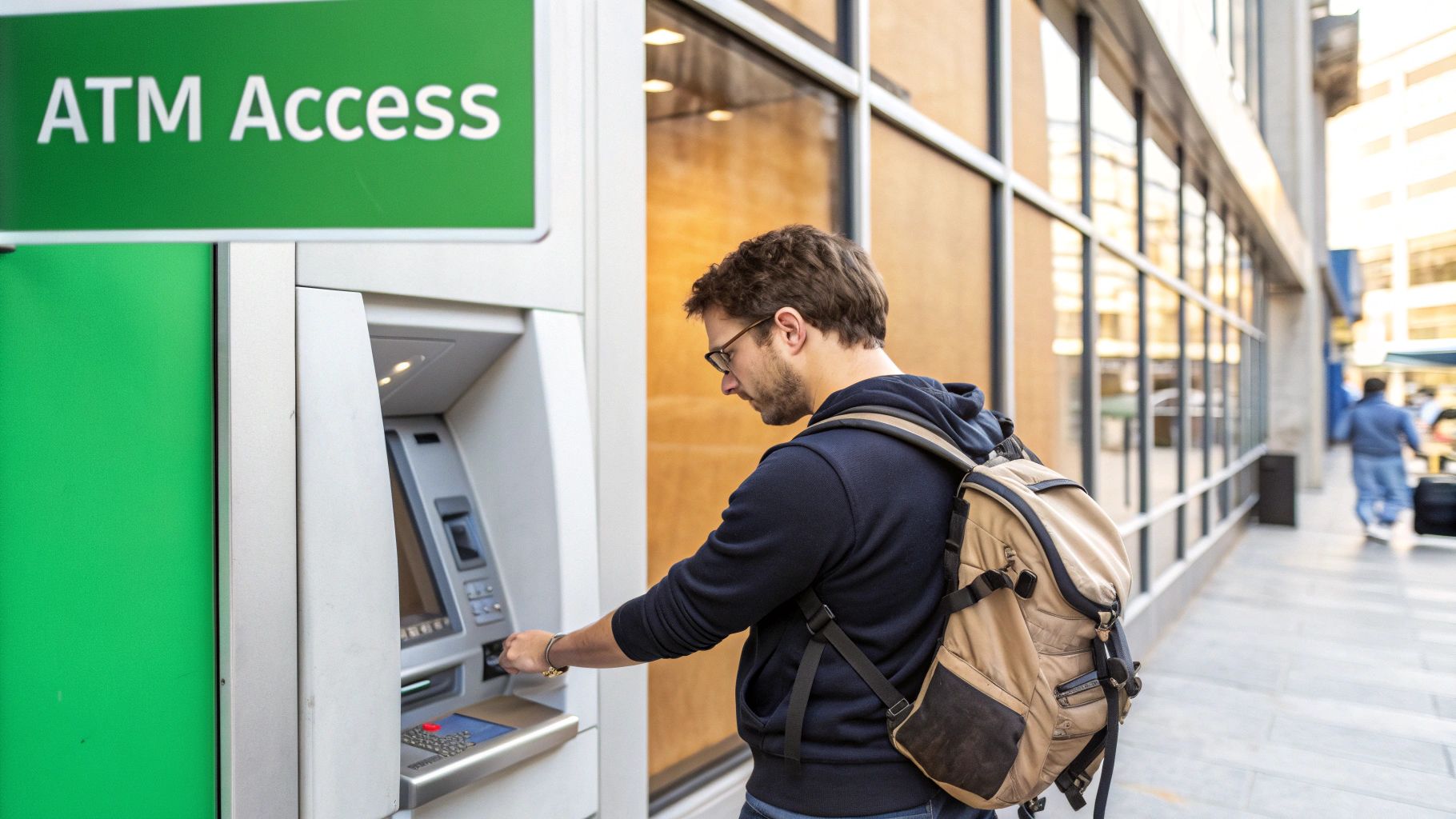
Whether you're backpacking on a shoestring or splashing out on a five-star escape, Cyprus has you covered. A bit of planning ensures you can soak up everything the island offers, from ancient ruins to sunset cocktails, without a single money worry. Let's break down what you can expect to spend.
Daily Budget Estimates
To give you a clearer picture, here’s a rough guide to daily costs. Think of these as a starting point – your actual spending will naturally shift depending on your tastes and what you get up to.
- For the Budget Traveller: Aim for around €50–€70 a day. This will comfortably cover a hostel bed, grabbing cheap and tasty eats from bakeries, using the local buses, and enjoying free activities like hiking or just chilling on the beach.
- For the Mid-Range Traveller: A daily budget of €100–€150 is a great target. This opens up a comfortable mid-range hotel, dinners at traditional tavernas, the odd taxi journey, and entry fees to major sights.
- For the Luxury Traveller: If you're after a high-end experience, plan for €250+ per day. This budget allows for luxury hotels, fine dining, private tours, and more exclusive activities.
A simple trick to manage your holiday fund is to set a daily spending goal. It's a fantastic way to keep track of your expenses without feeling restrictive, so you can properly relax and enjoy your trip.
Example Costs for Common Expenses
Knowing the price of everyday things really helps with planning. Here are some typical costs you'll find in the main tourist spots, giving you a real feel for how far your Euros will stretch.
- Three-course meal at a mid-range taverna: €20–€30 per person
- Pint of local Keo beer: €3–€4
- Cappuccino in a café: €3–€4.50
- Short taxi ride (about 5 km): €8–€12
- Entrance to an archaeological site (like Kourion): Around €4.50
Keeping these numbers in your back pocket will help you put together a flexible and realistic budget that perfectly matches your holiday style.
Your Cyprus Currency Questions, Answered
Even the most seasoned travellers have last-minute questions about money before a trip. Let’s clear up a few common queries about currency in Cyprus so you can feel completely prepared for your holiday.
Think of this as your go-to cheat sheet for managing your money on the island.
Can I Use British Pounds in Cyprus?
This is probably the most common question we hear, especially given the close ties between the UK and Cyprus. The short and simple answer is no – you can't use British Pounds (GBP) for your daily spending in the Republic of Cyprus.
Cyprus joined the Eurozone back in 2008, and the Euro (€) has been its one and only official currency ever since.
You might find the odd tourist shop in Paphos or Ayia Napa willing to take pounds if you're in a bind, but be warned: the exchange rate they offer will be terrible. You’ll pay a lot more for the convenience than if you’d just used Euros from the start.
Our Advice: Stick to Euros. Trying to spend pounds is impractical and will only cost you more in the long run.
Should I Exchange Money Before I Travel?
This really comes down to a classic travel dilemma: convenience versus value. There’s no single right answer, just what works best for you.
- Exchanging in the UK: The big advantage here is peace of mind. You’ll land in Cyprus with local cash in your pocket, ready for a taxi or a cold drink. The downside? High street banks and airport exchange counters rarely offer the best rates.
- Exchanging in Cyprus: If you wait until you arrive, you’ll almost always get a better deal. Head to a local exchange bureau in any town centre for more competitive rates. The only catch is that you have to find one first.
A smart approach is to get the best of both worlds. Change a small amount of cash in the UK before you fly – just enough for those first few hours. Then, once you’re settled, you can exchange the rest of your holiday money locally to get a much better rate.
Are Contactless Payments Widely Available?
Yes, absolutely. Cyprus is well and truly up to speed with modern payments. Contactless is the norm just about everywhere. In fact, card use jumped by 15% in 2023, growing faster than the Eurozone average.
You can confidently tap your card or phone at:
- Hotels and restaurants
- Supermarkets and shops
- Bars and cafes
The limit for a single tap-and-go payment is €50; for anything over that, you’ll just need to pop in your PIN. While cards are king in most places, it’s always a good idea to have a bit of cash on hand for smaller stalls, local markets, or the bus.
At SayCyprus, we're passionate about helping you discover the very best of the island. For more insider tips and detailed travel guides, explore our resources at https://www.saycyprus.com.









